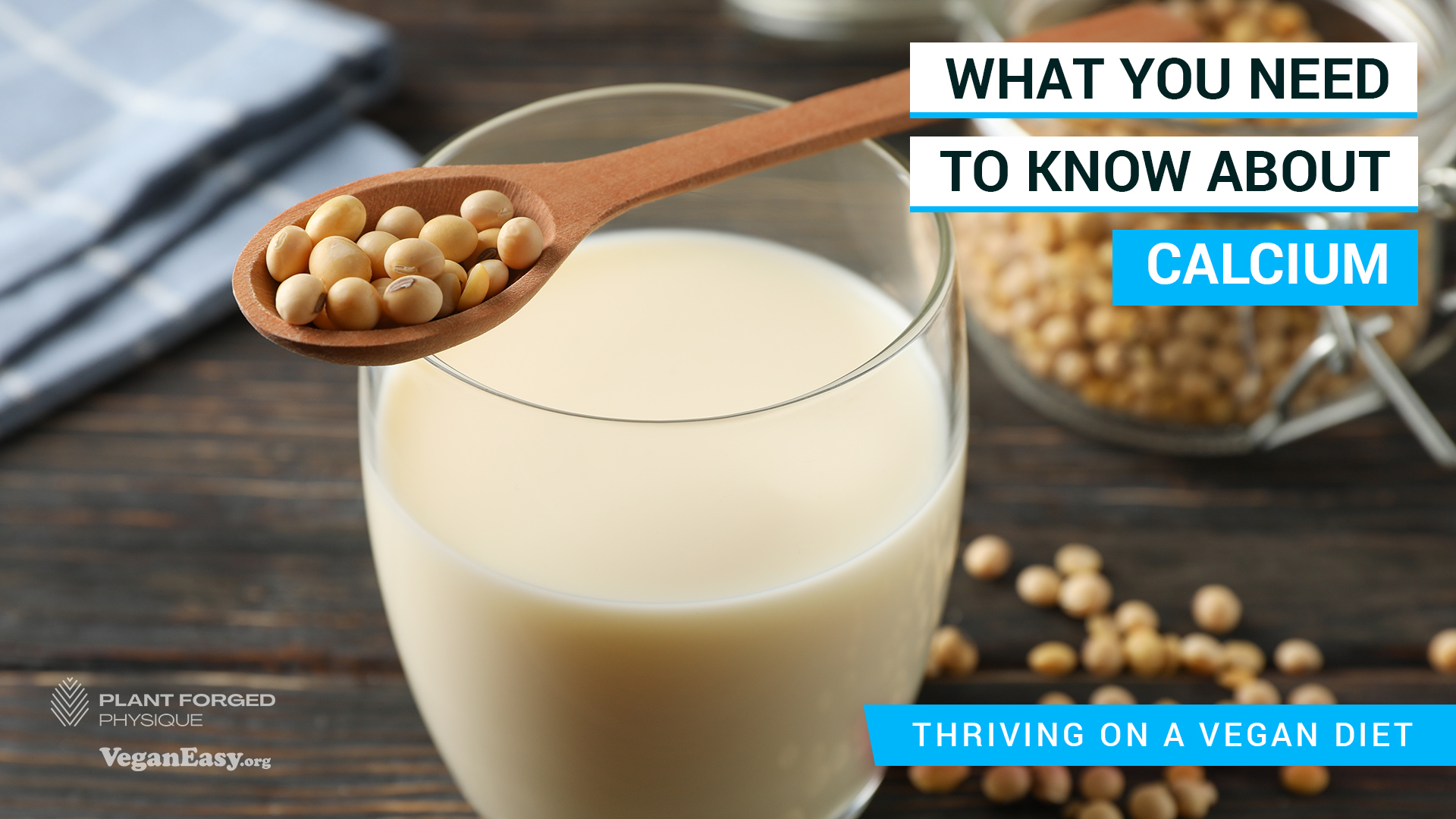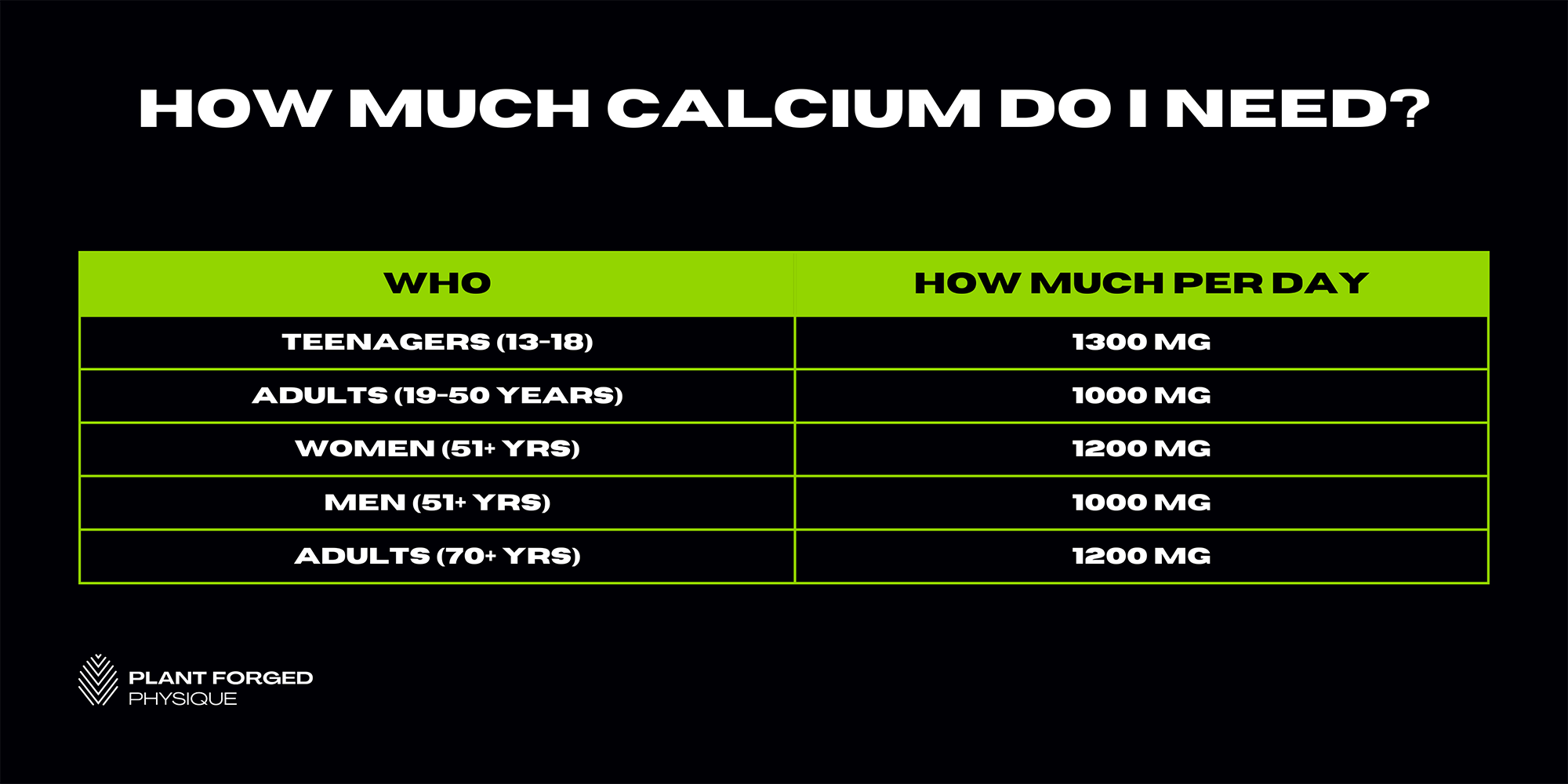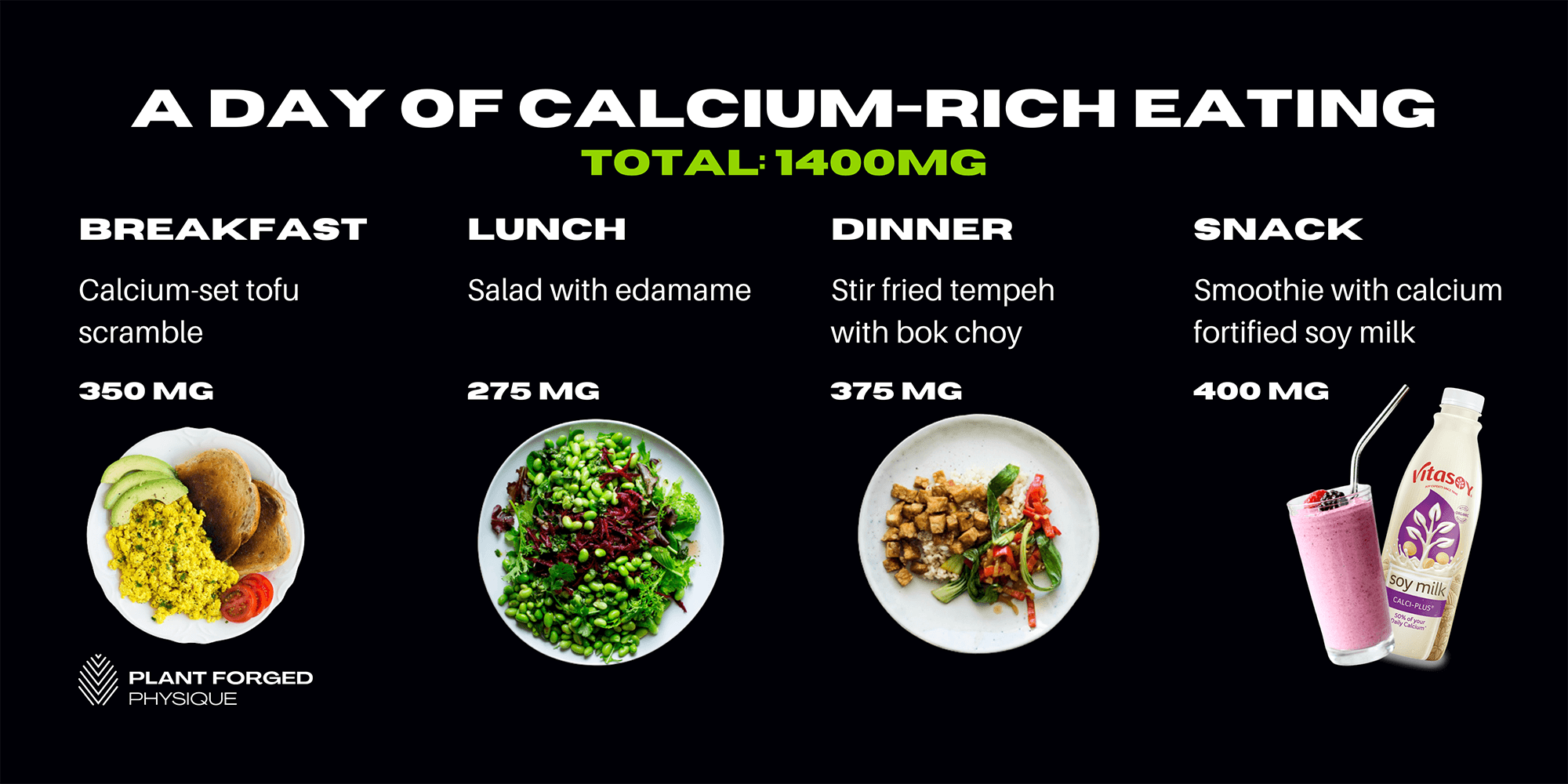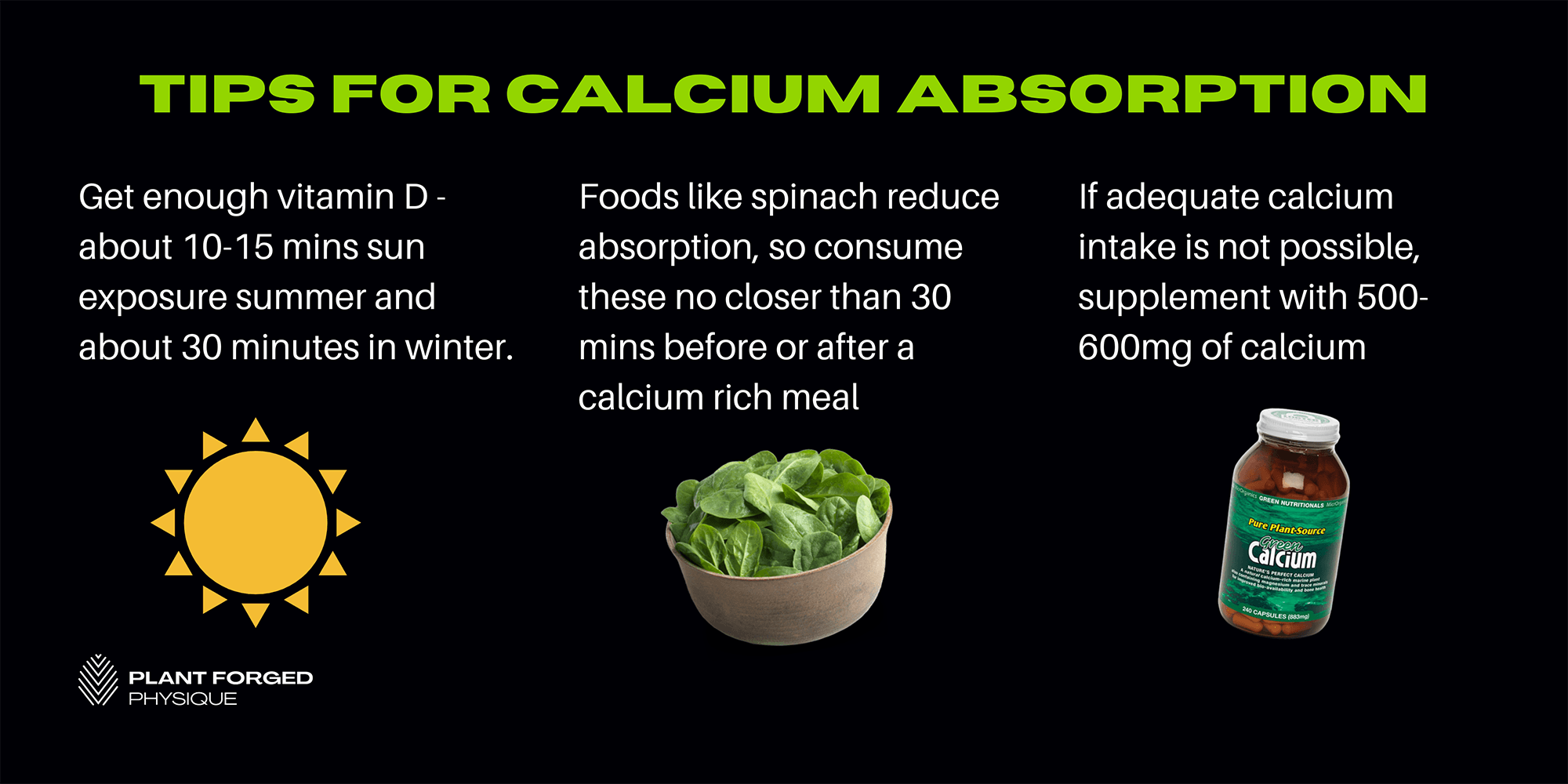
 Micronutrient mini-series
Micronutrient mini-series
This article series is a spotlight on the micronutrients, vitamins and minerals you need on a vegan diet. We look at where you can get them, how much you need, if supplementing is necessary, and tips for incorporating them into your plant-based diet.
Article by Caitlin Adler, a vegan Accredited Sports Nutritionist, Strength & Conditioning coach and bodybuilder at Plant Forged Physique. Her passion is helping vegans achieve their health and fitness goals with evidence-based guidance and expertise. Check out their free Vegan Supplement Cheat Sheet and other resources.
Calcium is a mineral needed for proper growth and maintenance of bones and teeth. Your body also uses calcium for maintaining proper muscle contractions, blood clotting, normal heart rhythm, and nerve function.
Calcium cannot be made by the body so must be obtained from food. Around 98% of our body’s total calcium is stored in our bones. The body uses our bones as a reservoir for calcium.
In order to maintain optimal health, the body must keep a consistent amount of calcium circulating in our blood and tissue.
When calcium is used up, it is then removed from our bones so that the body can use it. If this calcium is not replaced by consuming enough calcium-rich foods this reduces bone density and may lead to osteoporosis – where bones become brittle and fragile.
How much?
The recommended calcium intake for adults ranges from 1000 to 1300 mg of calcium per day.
There is no evidence that vegans require a higher calcium consumption than their meat-eating counterparts to meet their needs. In fact, calcium rich plants often have a higher bioavailability than animal-based foods.

For example, dairy foods have a bioavailability of about 30%. So if cow’s milk contains 240 mg per 200ml, then about 72 mg of calcium will be absorbed by the body.
Plants contain less calcium overall but have a higher bioavailability. For example, bok choy has roughly 160 mg of calcium in 1 cooked cup but has a bioavailability of 50% which means about 80 mg is absorbed.
So eating 1 cup of cooked bok choy absorbs as much calcium as 1 cup of cow’s milk.
Calcium-fortified juice and calcium-set tofu have a similar amount of calcium and bioavailability as dairy.
Some plant foods contain natural substances called oxalates and phytates. These bind to calcium and decrease its bioavailability. Spinach contains the most calcium of all the leafy greens but is high in oxalates. This lowers the bioavailability to about 5% – or the equivalent of absorbing 13 mg from the 260 mg of calcium in 1 cooked cup.
This does not mean you should avoid spinach, as it contains other valuable nutrients. But you should include a range of calcium-rich plants in your diet.
Where from?
Calcium is found in a wide variety of plant-based foods.
A good source of calcium contains +50mg per standard serve, while a great source of calcium would be 100mg or more. For example:
- 250ml of calcium fortified soy milk – 400mg
- 250ml of calcium fortified orange juice – 350mg
- 100g of non-calcium set firm tofu – 175 mg
- 100g of calcium set firm tofu – 350 mg
- 175g of edamame – 275mg
- 100g of tempeh – 110mg
- 100g of raw bok choy – 105mg
- 30g of chia seeds – 190mg
- 200g of baked beans – 120mg
- 100g of dried figs – 160mg

Adding calcium-rich foods throughout your meals each day can make meeting your recommended intake a lot easier.
Supplementing?
There’s a perception that because vegans exclude dairy that they may need to supplement calcium. This is not the case.
There is no evidence that a vegan or plant-based diet, when carefully planned to maintain adequate calcium, has any detrimental effects on bone health. In fact there are some findings that suggest a long-term plant-based diet may reduce the risk of osteoporosis – but further research is needed to confirm the mechanisms behind this.
If you struggle to consume enough calcium-rich plant foods or adequate calcium intake is not possible, Healthy Bones Australia advises that 500mg to 600mg of calcium supplements per day is considered safe and effective.
To improve the absorption of calcium, make sure you get enough vitamin D which assists with the absorption of calcium. Adults should get 600-800 IU each day of vitamin D. For most Australians, adequate vitamin D levels are reached through regular incidental exposure to the sun – or about 10-15 mins in summer and about 30 minutes in winter.
You can also plan your meals so that you do not eat calcium-limiting foods like spinach at the same meal as calcium-rich foods or with calcium supplements.

Key takeaways
Calcium is quite common in a plant-based diet – you just need to be a bit aware about which sources you pick and how often you eat them. Make sure you select foods each day that are rich in calcium, and get adequate sunshine each day to aid with absorption.
Summary
- Meeting your calcium needs is vital to thriving on a vegan diet
- Plant-based calcium is often easier for our bodies to absorb, even though there is less calcium in plants compared to animal-based foods
- Lots of vegan foods contain calcium, but try to include calcium-rich sources that have at least 100mg per serve
- Supplementing calcium isn’t really necessary on a vegan diet and there’s no evidence a plant-based diet can impact bone health when calcium needs are met
FREE VEGAN SUPPLEMENT CHEAT SHEET
Want to learn more about supplementing as a vegan?
Download the Free Vegan Supplement Cheat Sheet from Plant Forged Physique.
This handy evidence-based guide outlines exactly what supplements are needed to improve muscle gain, health, performance, recovery, and fat loss – and which ones are a waste of your time and money!

